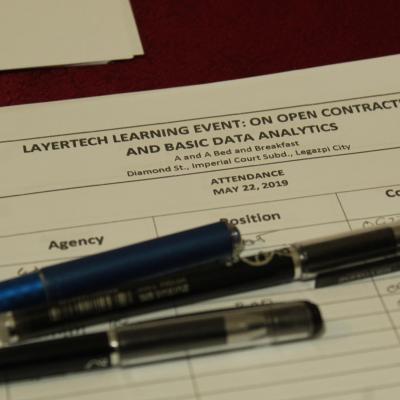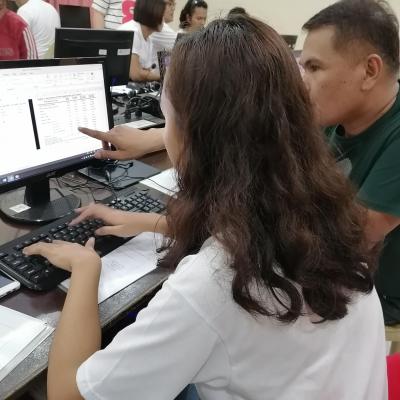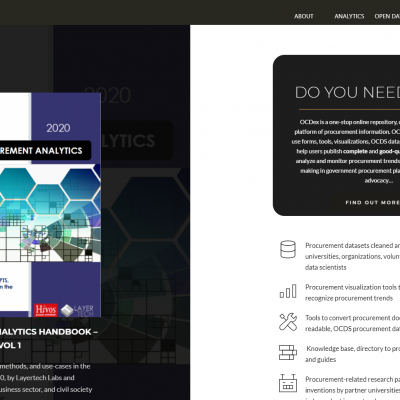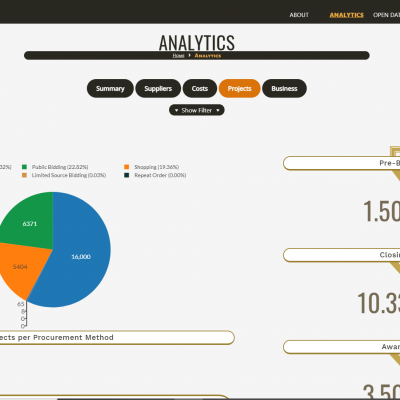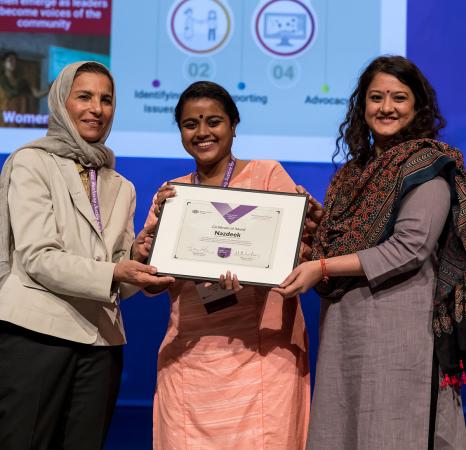Project Pitch and Q&A
Watch Layertech Software Lab's World Justice Challenge project pitch and join WJP's World Justice Challenge 2021 Community Forum to ask questions to project representatives, explore additional resources, meet new colleagues, and more. Join the discussion and help us build stronger rule of law values, institutions, and communities around the world.
Ask your question at the Community Forum
Project Summary
From 2018-2020, Layertech led Project OCDex, an inspection of Philippine procurement data to inform stakeholders of government procurement and contracts. Official public procurement data released (PhilGEPS) is collected and automatically pre-processed, processed, visualized, and analyzed to detect procurement red-flags, inefficiencies, and monitor details of contractors and contracts awarded. Pre-processed data is released for local researchers to conduct in-depth inspection and studies.
The project published a Procurement Analytics Handbook (compilation of methods and studies using OCDex data), and three peer-reviewed research papers on the impact of OCDex:
- In informing HIV/AIDS advocacy,
- In automatically detecting bottlenecks in the procurement process, and
- In informing local businesses bidding strategy, and encouraging them to join government procurement to reach optimal bidding conditions.
Problem Statement
Inefficiencies and corruption in government procurement leads to unfair and/or substandard service delivery, ultimately affecting the public's value for money. Philippine Government Procurement law mandates release of procurement information. However, datasets released can be resource-heavy, difficult to download and use, and not encouraging for the ordinary citizen to refer to for monitoring and/or to answer procurement related queries. For example, one excel file contains ten thousand entries with 1-3 gigabytes of memory each. Most citizens who are not tech-savvy find this difficult to download with very low Philippine internet speed and bandwidth, plus, the format is very confusing and difficult to browse through.
Therefore, even though procurement data is 'available,' it is not 'accessible' and 'usable.' OCDex uses this official procurement data, automatically pre-processes and processes it, visualizes insights, and presents it to the end users in an insightful and easy-to-understand manner. The pre-processed data are also uploaded as open datasets used by researchers to extract insights, data-driven policy, and practice recommendations. The team is currently working with different civil society organizations, local governments, schools, and the private sector to monitor sector-specific government contracts and identify red flags and bottlenecks.
In 2020, because of COVID-19, government procurements have been expedited, bypassing normal procurement measures that ensure transparency and fairness. Five teams of researchers used OCDEx government procurement datasets to monitor the contracts and detect inefficiencies and red flags in COVID-19 related government procurement. The project has produced policy recommendations (local and national), practice changes, peer-reviewed studies, technical reports, and a textbook compilation of methods and use-cases. The OCDex project was launched in 2018 in Albay province, Philippines, and is currently headquartered in the same province.
From 2018 to present, OCDex processed data of national government agencies (e.g. department of health), and several local government units in the country, in partnership with different CSOs and universities. OCDex funding by Hivos ended in Q3 2020, and is currently being maintained by Layertech and researchers of Bicol University College of Science. The project and the portal continue to provide free procurement analytics, tools, and studies, to the public.
Project Description
The Philippines' Government Procurement Law has safeguards to ensure transparency, fairness, and value for money in government procurement. With the COVID-19 pandemic, many 'emergency procurements' have been declared all over the country, many of them bypassing the usual safety nets and measures mandated by the law. In fact, during the early Q1-Q3 of the COVID-19 pandemic, the mandated release of procurement data in the usual PhilGEPS public portal did not happen as scheduled. With this, OCDex worked with five teams of researchers/faculty from partner Bicol University to collect procurement data, analyze it, and extract insights. This yielded critical findings that showed bottlenecks, inefficiencies, and red flags related to COVID-19 procurement, and other sector-specific issues such as procurement related to online education for students and educators (findings are digested here). The project follows the principle that if timely and relevant government procurement information is made accessible to the public and stakeholders (through clean datasets for researchers, or user-friendly interfaces to monitor government contracts, trainings, capacity building etc.—all of which the team did from 2018 onwards), the public will be empowered to monitor public funds and government expenditures, demand for accountability, and flag malicious and unfair transactions. This has been observed and recorded by the team in our project implementations.
From 2018 to present, the team conducted a series of FGDs, interviews, and user-centric design methodology to construct the OCDex portal and its tools. In parallel, the team conducted several training sessions, teaching CSOs, private sector/businesses, universities, and even local governments basics on procurement law, basics on data analytics, and how to use the tools and the portal to analyze official procurement data. The stakeholders we trained were able to:
- Create data driven policies (for local government);
- Influence bidding strategies to reach optimal bidding conditions (for business sector);
- Use insights generated for advocacy purposes (in this case, CSOs working on HIV/AIDS advocacy); and
- Use data to create automated monitoring mechanisms to detect procurement bottlenecks (researchers and programmers).
Results have peer-reviewed documentation, and documentation is available upon request. In brief, stakeholders were able to formulate better advocacy steps, they were able to demand for accountability, and flag questionable transactions, which could have been otherwise hidden without the data and tools released.
Project Impact and Potential for Scaling, Replication, and Sustainability
Critical factors that contribute to OCDex's sustainability include local government support (in accepting policy/practice recommendations from data analyzed and responding to stakeholder flagging), support from civil society organizations who are active users of data for their sectoral advocacy, the business sector who are also innately interested in procurement data for their bidding-related decision making, and, finally, researchers and volunteers who are equipped with technical know-how, who frequently update and maintain the system, producing research out of these actual data (in this case, the university partners).
Replication to an LGU, therefore, requires three key components: one is to identify a local university partner that will analyze procurement data and generate actionable insights; two, are local public/CSOs that will be trained to use OCDex and its insights for advocacy and procurement monitoring; and three, a willing LGU that will use generated insights for data-driven decision making, and enact enabling policies.
The OCDex system is designed to work with systematic crowdsourcing. The more universities and volunteer researchers that are on board, the more OCDex will provide up-to-date, relevant data and insights, vital in both local government decision-making and CSO advocacy. The project is very ripe for scale out. In fact, in 2019, the team had already started processing data requests and conducting trainings from other local governments in the Philippines.
However, the more cities that use OCDex data and tools, the higher the computing requirements will be. At the moment, the cloud infrastructure is designed only for the use of the entire province of Albay (which houses 19 local government units). For this, OCDex developers designed a parallel computing backbone, with several 'hosts,' for fault tolerance and availability. Creating a 'shared knowledge base' is also highly recommended, so that different local governments using OCDex can do peer-tech support, discuss and help each other, share best practices, etc. This ecosystem design around OCDex minimizes the need for one single entity, even Layertech, to control and possibly manipulate the system, and minimizes the need to constantly attend to tech support needs which often creates a tech support bottleneck in the mechanism.
Featured Resources
- OCDex Public Procurement Analytics 2020 (PDF)
- The Philippine Open Government Partnership National Action Plan 2019-2020 (PDF)
- Open Up Contracting: "Empowering the 100" (Apr 2019)
- Hivos: "Layertech Labs: Securing Buy-in From the Top Down"
Key Project Links
Social Media: Facebook, YouTube, LinkedIn
Website: ocdex.tech
Submit Your Questions and Get Ready to Pick a Winner!
Representatives of World Justice Challenge 2021 finalist projects are on hand to answer your questions. Join our online Community Forum to engage with finalists, share resources, and network with other members of the rule of law community. Submit your questions now and get ready to vote for your favorite project—voting opens in mid-April!
Join the Conversation
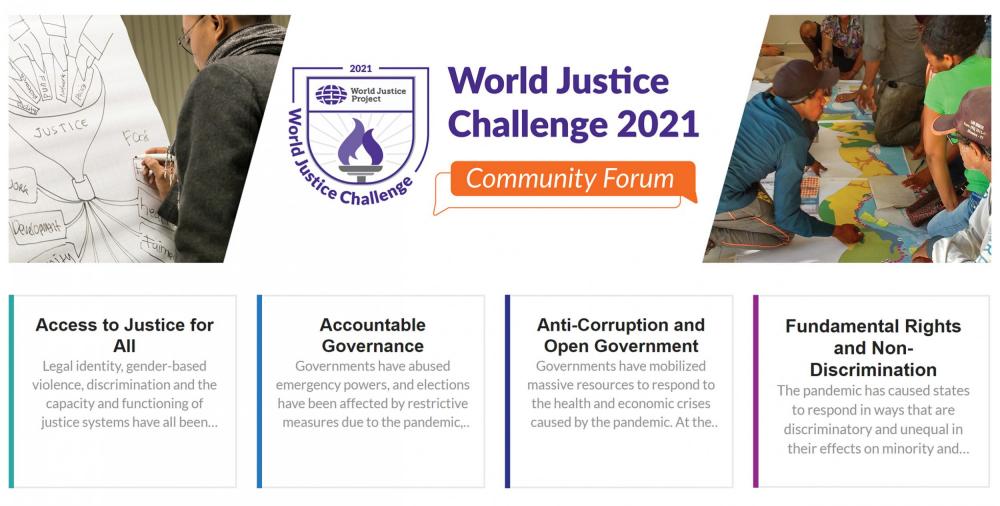
Program Photos
(Click to expand)
